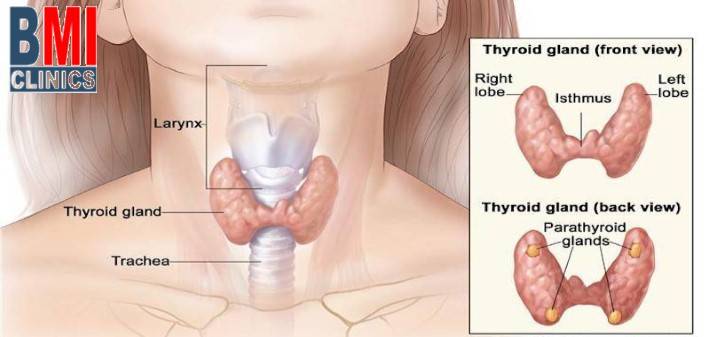Is the thyroid gland related to excess weight? Obesity is one of the biggest medical concerns for a majority of people living in the Middle East and other parts of the world. This is because people suffering from obesity and excess weight gain are more at more at risk of developing hypertension, Type 2 Diabetes, high blood pressure, heart disease and other serious conditions.
People with a Body Mass Index (BMI) of 30 and above are obese, while those with a BMI of 25-29 are considered overweight. Although obesity and excess weight gain is often associated with overeating, it can also be caused by underlying medical issues such as hypothyroidism.
Thyroid gland function
Located in the front of the neck, the thyroid gland is a large ductless gland that makes, stores and secretes hormones which regulate how the body uses up food for energy. The thyroid hormones released into the bloodstream affect the metabolic rate, which determines how fast or how slow your body functions.
Sometimes, the thyroid gland malfunction, becoming either overactive or under-active. An overactive thyroid gland causes the metabolic rate to rise too high. This condition is called hyperthyroidism.
On the other hand, hypothyroidism occurs when the thyroid gland cannot produce enough of the thyroid hormones to enable the body to function as it should. This hormonal imbalance usually causes the body’s metabolic rate to slow down to very low levels.
Hypothyroidism may be caused by several factors, the most common of which include: autoimmune diseases, radiation therapy, thyroid surgery, hyperthyroidism treatment and many others.
How is the thyroid gland linked to obesity?
The thyroid hormones produced by this gland regulate the basal metabolism, which significantly affects food intake and fat oxidation as well as lipid and glucose use. Because of this, abnormalities in thyroid functions usually cause changes in body weight.
Overweight people who also have hypothyroidism have problems losing weight. This ‘stubborn weight’ usually refuses to go down, even when one is dieting and consuming fewer calories. This is because the rate at which the calories broken down continues to fall as the calories consumed reduce.
When you have hypothyroidism, your thyroid gland cannot produce enough hormones, and, being under-active, your body metabolism gradually slows down to abnormal levels. This reduced metabolism causes the body and organ functions to slow down and results in increased weight gain.
Many women experience hypothyroidism and weight gain with frequent hormonal changes, especially during pre-menopause. Coupled with frequent dieting and monthly hormonal changes throughout their lives, this usually undermines their metabolic rate and increases the hypothyroidism incidence.
Thyroid problems become more common during menopause. This is mainly because the problems are at first confined within the thyroid gland itself and only reveal themselves when a broader pattern of hormonal disparity develops.
What are the symptoms of hypothyroidism?
Many people who suffer from hypothyroidism may not even realize it at first. This is because the hormone dysfunction does not occur at once. It may develop progressively causing metabolism to slow down over a given period of time, sometimes even a number of years.
The symptoms of this condition also vary depending on how severe the hormone deficiency is. However, as metabolism continues to slow down, other pronounced symptoms such as weight gain, fatigue, dry skin, a puffy face and increased sensitivity to cold, muscle weakness or aches, depression, a hoarse voice and other symptoms become more noticeable.
Can Men Suffer from Hypothyroidism?
Although hypothyroidism is more prevalent in women, it can also affect men. The symptoms will usually manifest themselves in the same way, and the decreased metabolic rate will cause the same problems that women experience. However, unlike in women, weight gain resulting from hypothyroidism is less common in men.
If you notice that you have a high blood cholesterol level and an increased weight and some or all of the above symptoms, it is important to talk to your doctor. Your excess weight gain may be the result of an underlying thyroid deficiency. Your doctor will perform blood tests to check the thyroid hormone levels. This will confirm or rule out thyroid deficiency as a cause of your obesity.
Trying to lose weight without addressing the underlying conditions that may be contributing to the weight gain or compounding it is useless.
If your obesity is caused or compounded by hypothyroidism, you will be treated to correct the thyroid function. Once the thyroid function return to normal, diet and exercise will be more efficient in your journey to lose weight.









